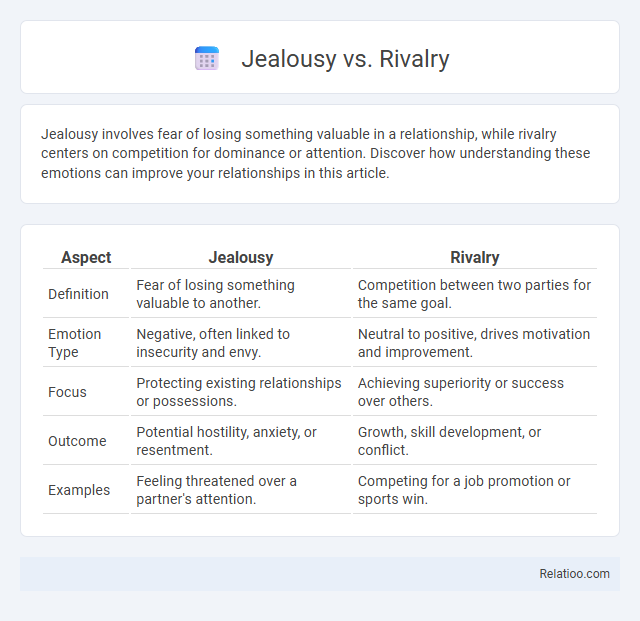Jealousy involves fear of losing something valuable in a relationship, while rivalry centers on competition for dominance or attention. Discover how understanding these emotions can improve your relationships in this article.
Table of Comparison
| Aspect | Jealousy | Rivalry |
|---|---|---|
| Definition | Fear of losing something valuable to another. | Competition between two parties for the same goal. |
| Emotion Type | Negative, often linked to insecurity and envy. | Neutral to positive, drives motivation and improvement. |
| Focus | Protecting existing relationships or possessions. | Achieving superiority or success over others. |
| Outcome | Potential hostility, anxiety, or resentment. | Growth, skill development, or conflict. |
| Examples | Feeling threatened over a partner's attention. | Competing for a job promotion or sports win. |
Understanding Jealousy: A Psychological Overview
Jealousy is a complex emotional response involving fear of loss and insecurity, often triggered by perceived threats to valued relationships. Unlike rivalry, which centers on seeking superiority or dominance, jealousy arises from anxiety over potential deprivation of affection or attention. Psychological studies highlight how jealousy activates brain regions linked to emotional regulation and social cognition, underscoring its blend of cognitive and affective processes.
Defining Rivalry: Concepts and Contexts
Rivalry involves a mutual and ongoing contest between parties aiming to achieve superior status or success in a shared domain, often marked by respect and recognition of each other's abilities. Unlike jealousy, which arises from fear of losing something you have, rivalry drives motivation by encouraging improvement through direct challenges. Your understanding of rivalry enhances strategic thinking in scenarios where competition fuels growth rather than hostility.
Key Differences Between Jealousy and Rivalry
Jealousy involves a fear of losing something valuable to another person, often rooted in insecurity and emotional attachment, whereas rivalry centers on a direct contest or struggle for superiority in skills, status, or achievements. Jealousy typically manifests in personal relationships with feelings of envy and possessiveness, while rivalry is commonly observed in professional or social environments driven by ambition and comparison. Understanding these distinctions helps clarify motivations behind behavior and emotional responses in various interpersonal dynamics.
Common Triggers of Jealousy in Relationships
Common triggers of jealousy in relationships include perceived threats to emotional intimacy, such as a partner's close friendships or attention toward others. Insecurity and fear of loss often amplify feelings when one partner experiences rivalry or competition for affection and validation. Recognizing these triggers can help manage jealousy by fostering trust and open communication.
The Roots and Dynamics of Rivalry
Rivalry stems from a long-term struggle for status, resources, or recognition between individuals or groups, often fueled by repeated interactions and historical grievances that create a persistent competitive dynamic. Unlike jealousy, which arises from fear of losing something valuable to another, rivalry is propelled by mutual awareness and ongoing comparison, intensifying the motivation to outperform the other party. Your understanding of rivalry's roots helps manage its dynamics, turning potentially destructive conflict into constructive motivation for growth and achievement.
Emotional Responses: Jealousy vs Rivalry
Jealousy triggers feelings of insecurity and fear of losing something valuable to someone else, often harming your emotional well-being. Rivalry, in contrast, sparks a sense of motivation and determination to improve oneself by outperforming a competitor. Understanding these emotional responses helps you channel feelings constructively and navigate interpersonal dynamics more effectively.
Impact on Personal and Professional Life
Jealousy often damages personal relationships by fostering resentment and insecurity, while rivalry can motivate self-improvement but may also strain trust and collaboration. Competition in professional settings drives innovation and productivity, yet excessive rivalry may lead to unethical behavior and workplace conflict. Balancing these emotions is crucial for maintaining healthy interactions and achieving long-term success both personally and professionally.
Healthy vs Toxic Expressions of Jealousy and Rivalry
Jealousy, rivalry, and competition often intersect but differ in their emotional impact and outcomes; healthy jealousy fosters self-awareness and motivates personal growth, while toxic jealousy breeds resentment and insecurity. Rivalry becomes constructive when it encourages you to improve and innovate without undermining others, but turns destructive if it leads to sabotage or persistent hostility. Understanding these nuances helps you channel competitive instincts toward positive achievements rather than harmful conflicts.
Coping Strategies for Managing Jealousy and Rivalry
Effective coping strategies for managing jealousy and rivalry include practicing self-awareness to identify underlying insecurities and redirecting focus toward personal growth. Developing open communication skills fosters understanding and reduces misunderstandings in competitive or rivalrous relationships. Engaging in mindfulness techniques and setting realistic goals can help maintain emotional balance and transform jealousy into motivation.
Building Positive Outcomes from Jealousy and Rivalry
Jealousy and rivalry can be transformed into powerful motivators for personal growth and achievement when you channel these emotions constructively. Fostering self-awareness and focusing on skill development allows jealousy to inspire improvement rather than resentment, while healthy rivalry encourages collaboration and innovation. Embracing competition as an opportunity to learn from others promotes positive outcomes, strengthening your resilience and drive toward success.

Infographic: Jealousy vs Rivalry
 relatioo.com
relatioo.com